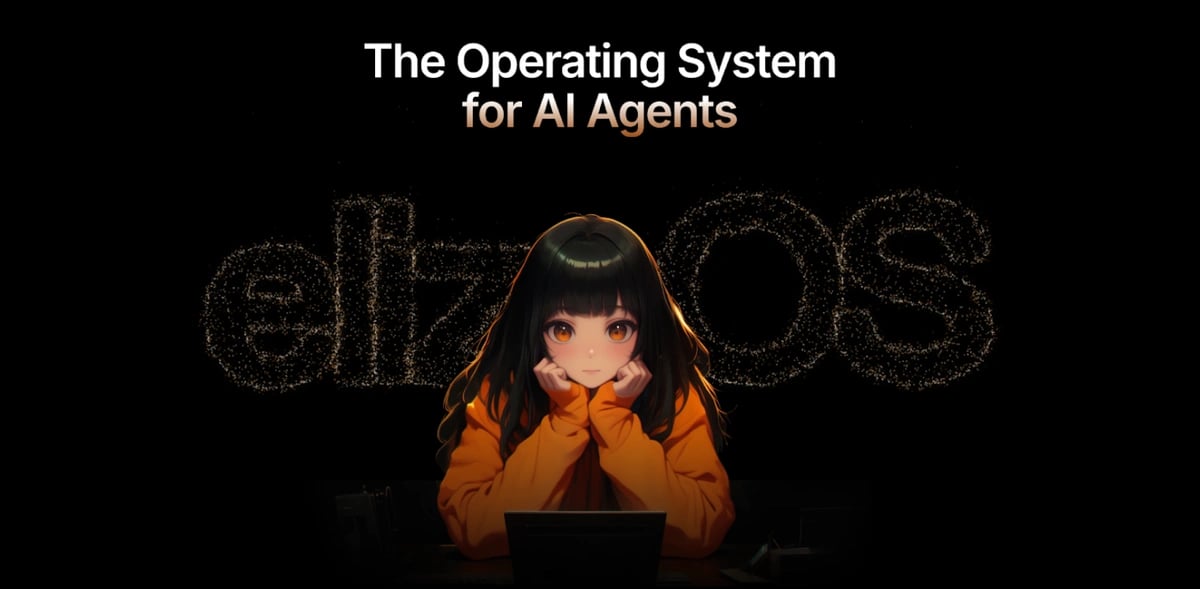Subscribe to wiki
Share wiki
Bookmark
ElizaOS
The Agent Tokenization Platform (ATP):Build autonomous agents with the Agent Development Kit (ADK)
0%
ElizaOS
ElizaOS (formerly ai16z) is an open-source, TypeScript-based framework for developing autonomous AI agents that can think, learn, and act autonomously. These agents interact with users, perform tasks, and integrate with blockchain systems. Launched in October 2024, the framework supports multiple blockchains, including Solana, Ethereum, Base, and Binance Smart Chain. It enables the creation of decentralized AI-driven applications, such as trading platforms where AI agents analyze data, assess market sentiment, and execute trades on-chain and off-chain. In November 2025, the project initiated a token migration from its original token $ai16z to $elizaOS. [1] [4] [5]

Eliza Labs
Founded by Shaw Walters, Eliza Labs is a foundation with the core mission of supporting and accelerating the growth and adoption of ElizaOS. Eliza Labs also serves as a research and development hub for creating new agent-based projects and supporting open-source contributors through grants. [1] [9]
Eliza Framework
ElizaOS is a modular, TypeScript-based framework that supports the development of AI agents capable of performing various tasks, from basic user interactions to complex decision-making processes. The agents execute these tasks autonomously, and interactions can occur within the blockchain environment and across other digital platforms. The framework is designed for flexibility, allowing developers to deploy projects in various environments, from local machines to cloud-based production systems. [5]
Core Architecture
The framework is built on a modular architecture centered on Agents, Plugins, and a core Runtime environment. The v2 release in 2025 introduced significant architectural improvements to address limitations in the v1 design, such as a cluttered codebase and fragmented wallet management. [5] [9]
- Agents: The fundamental actors in the framework. Their identity, personality, and behavior are defined through "character files." They possess persistent memory, allowing them to learn from past interactions, and are managed by a runtime that controls their operational state.
- Plugins: Modular extensions that grant agents the ability to perform actions and interact with external systems, such as social media platforms, DeFi protocols, and blockchain networks. This allows for extensive customization without altering the core framework.
- Runtime Environment: The core engine that orchestrates agent operations, state management, and communications. It manages the event system that triggers agent actions, integrates with external services and AI models, and handles the persistence layer for agent memory.
- Unified Abstraction Layer: A key feature of v2, this component includes a unified wallet system that enables agents to manage assets across multiple blockchain networks from a single interface, improving on the fragmented system of v1. [9]
Key Capabilities
ElizaOS provides a comprehensive set of features for developing sophisticated AI agents. The v2 framework enhanced these capabilities with an event-driven architecture and Hierarchical Task Networks (HTN), allowing agents to deconstruct complex goals into smaller tasks and adjust plans dynamically. [5] [9]
- Personality & Goal Definition: Agents can be given unique personalities and goals using simple character files.
- Real-World Interaction: Agents can take actions in the real world through an extensive plugin ecosystem.
- Natural Language Execution: Agents are capable of executing complex, multi-step action chains triggered by natural language commands.
- Persistent Memory: The framework includes a memory system that allows agents to learn and recall information from all interactions.
Plugin Ecosystem
The framework is supported by a diverse ecosystem of over 90 official plugins, enabling agents to interact with a wide array of platforms and services. Categories include: [5]
- Social Platforms: Discord, Twitter, Telegram.
- Blockchain Networks: Ethereum, Solana, Base, and other chains.
- AI Providers: OpenAI, Anthropic, OpenRouter, and local models.
- DeFi Protocols: Tools for trading, lending, and yield farming.
- Content Creation: Image generation, video, and music creation.
- Data Analysis: Web scraping, API integrations, and database interactions.
Design Philosophy
The development of ElizaOS is guided by three core principles aimed at accessibility, scalability, and community collaboration. [5]
- Three Minutes to First Agent: The framework is optimized for a rapid start, enabling a developer to install the framework, create an agent, and run it with just three commands.
- Built for Everyone: ElizaOS is designed to scale with user needs, supporting simple projects with a single character file as well as complex production systems handling millions of interactions.
- Truly Open Source: The project emphasizes community involvement, with an open-source codebase that encourages developers to extend the framework through plugins and contribute to the core code.
ElizaOS v2 Token and Migration
On October 8, 2025, Eliza Labs announced a token migration from the original $ai16z token to a new, multichain token, $elizaOS. The migration was part of the launch of the elizaOS v2 architecture, designed to support a cross-chain "generative economy." [4] [7]
Migration from elizaOS
The migration window opened on November 6, 2025, at 18:00 UTC and is scheduled to close on February 4, 2026. During this 90-day period, holders can convert their tokens through an official migration portal. The process involves a 1:10 supply redenomination. For each 1 $ai16z token migrated, the holder receives 6 $elizaOS tokens, while the remaining 4 $elizaOS tokens are allocated to the Generative Treasury. [4] [6]
$elizaOS Tokenomics
The $elizaOS token has a hard cap of 11 billion tokens with no ongoing emissions. The total supply is designed to expand from an initial 6.6 billion (from holder swaps) to the 11 billion cap as the Generative Treasury is funded. At the start of the migration, the circulating supply increased by 882 million tokens to provide liquidity for exchanges and protocol-owned liquidity (POL). [4]
The token distribution is allocated as follows: [6]
- Community (75%): Includes current holders (60%), liquidity and listings (5.5%), the foundation (4.5%), the ecosystem (2.5%), and POL (2.5%).
- Team & Contributors (10%)
- SAFT Investors (15%)
Vesting schedules are enforced programmatically by Streamflow smart contracts. The Team & Contributors allocation has a 12-month cliff followed by a 24-month linear vest. [4]
Generative Treasury
A core component of the v2 tokenomics is the Generative Treasury, which is funded by the token redenomination during the migration. Its purpose is to autonomously manage assets to generate yield, deepen on-chain liquidity, and fund ecosystem growth. The treasury is operated by autonomous multichain agents that execute policy-driven liquidity and treasury routines across supported chains. [4] [6]
Technical Specifications
-
Token Ticker: $elizaOS
-
Supported Blockchains: Solana (SPL), Ethereum (ERC-20), Base (ERC-20), and Binance Smart Chain (BEP-20).
-
Cross-Chain Protocol: The token uses Chainlink's Cross-Chain Interoperability Protocol (CCIP) for bridging and interoperability, enabling agents to coordinate strategies and move assets across chains. [10]
-
Contract Addresses:
- SVM (Solana):
DuMbhu7mvQvqQHGcnikDgb4XegXJRyhUBfdU22uELiZA - EVM (Ethereum, Base, BSC):
0xea17Df5Cf6D172224892B5477A16ACb111182478
- SVM (Solana):
Multiple centralized exchanges, including Binance, Bybit, KuCoin, and Gate.io, announced support for the migration. [4]
Developments
Eliza Labs Launches Auto.fun
On April 17, 2025, Eliza Labs officially launched Auto.fun, a no-code platform for creating AI agents that interact with Web3 services, enabling users to automate DeFi and social media. [3]
Auto.fun allows for the creation, deployment and monetization of AI agents by non-developers without programming knowledge, according to an April 17 announcement.
The platform supports the creation of AI agents that interact with social media, decentralized finance (DeFi) apps and other Web3 services.
“The vision for auto.fun is to democratize access to both AI and Web3 technologies by creating agents that can execute tasks autonomously on behalf of users,” said Shaw Walters, founder of Eliza Labs and the open-source elizaOS. [3]
Eliza Labs said auto.fun will allow users to create agentic AI systems that both respond to queries and perform tasks. Users will purportedly be able to tell their AI agents what to do with their funds in DeFi through simple commands. [3]
See something wrong?
The Agent Tokenization Platform (ATP):Build autonomous agents with the Agent Development Kit (ADK)
